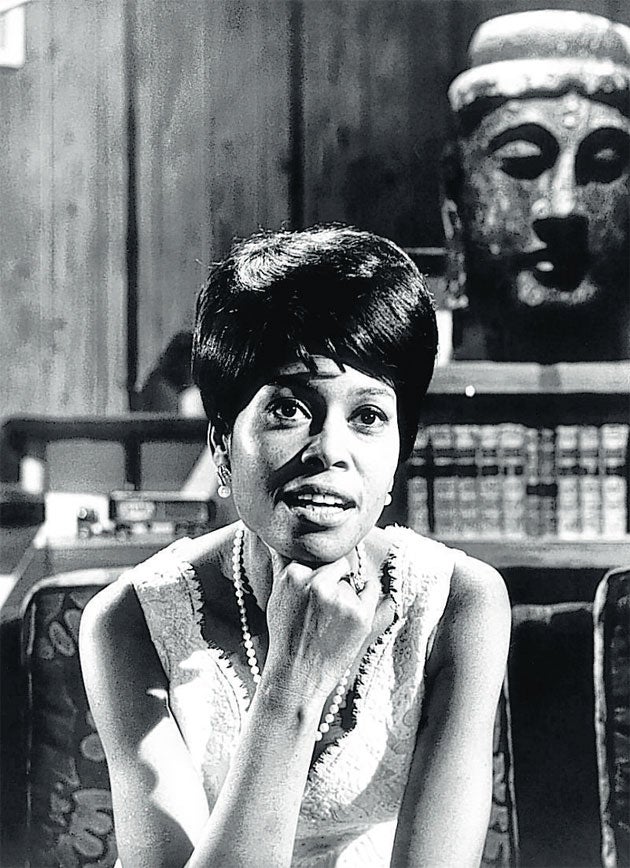Abbey Lincoln: Singer and actress who became a champion of the civil rights movement

"If I'm bitter – and I'm sure I am – I have no feelings about that bitterness really. If there's a chip on my shoulder I didn't put it up there."
Abbey Lincoln's life changed in 1957 when she began to devote it to righting the wrongs that American society inflicted on black people.
She had previously been glamorous and had come to fame in the 1956 film The Girl Can't Help It when she performed while wearing a dress that Marilyn Monroe had previously worn in Gentlemen Prefer Blondes. She can be seen on YouTube wearing this dress while she sings a spectacular version of the title song. But she made sure the glamour was muted after 1957 as she became a dour fighter in what she saw as the racial struggle. She was an extraordinary singer whose technique and knowledge of music fitted her to work with some of the greatest jazz musicians of her time.
Abbey Lincoln was the ninth of 12 children and had an unpleasant childhood. "If I asked for anything and my mother said 'no' I didn't dare ask again," she said. "She used to explain to us, 'You're no fool. You see I'm doing the best I can, so don't make things more difficult.' So we all shared the responsibility of being poor by suppressing some of our childish wants. I never remember being carefree or irresponsible. I have always been aware of all of my circumstances."
Growing up on a farm in Michigan, Lincoln was 14 when she was instantly fascinated by Billie Holiday after her older sister brought home some of Holiday's records. Holiday remained her main musical influence for the rest of her life and in 1987 she recorded two albums called Abbey sings Billie.
Lincoln became a professional singer in 1950 when she was 20, working for $5 a night. She also took a job as a maid and cleaner during the day to build up her earnings. She moved to Los Angeles in 1951 and took on an agent. His area included Hawaii and Alaska and the first job he found for her was in Honolulu. She went there in January 1952 and was so successful she stayed until the beginning of 1954.
This meant that when she returned to Los Angeles she was immediately groomed to become a sophisticated star. Her nightclub material was worked up into production numbers aimed more at showing off her beauty and body than her voice; a national magazine featured her on its cover in Monroe's flaming red dress.
Her first album, in 1956, was with backing by Benny Carter's band. It was at this time that she took the name Abbey Lincoln, having worked under several others before. She starred with Ivan Dixon in the film Nothing but a Man (1964) and was given a Golden Globe nomination for her performance in For Love of Ivy (1968) in which she starred with Sidney Poitier and Beau Bridges, playing a maid who wants to better herself.
Soon after meeting the drummer Max Roach in 1960 she sang on Roach's We Insist – Freedom Now suite which had lyrics written by Oscar Brown, Jr. The music was a message rather than entertainment and was uncomfortable to listen to.
She married Roach in 1962 and the marriage lasted until they divorced in 1970. During this period she worked and recorded with many front-line jazz musicians including Miles Davis, Sonny Rollins, Eric Dolphy, Clark Terry and Joe Lovano. Thanks to her marriage to Roach she came to regard Thelonious Monk and Charles Mingus as close friends. She made 20 albums under her own name including one, You Gotta Pay the Band (1991) with Stan Getz and Hank Jones. The last one, in 2007, was her ninth for the Verve label and was called Abbey Sings Abbey. It was made up of some of the many songs she had composed during her career.
Lincoln's voice declined in her later years but she compensated for this with an increase in her songwriting, and her works were taken up by younger singers like Cassandra Wilson and Kendra Shank. Many of her lyrics, which were invariably concerned with social issues, had a poetic quality to them.
Because of her concern for the poor and the disadvantaged she was given many civic and community awards. In later years she lectured at schools and universities and taught theatre for a year at Cal State University in Northridge. In 1990 she had a role in Spike Lee's film Mo' Better Blues and in 2003 she was given the National Endowment for the Arts Jazz Masters award.
Anna Marie Wooldridge (Abbey Lincoln), singer, songwriter and political activist: born Chicago 6 August 1930; married 1962 Max Roach (divorced 1970); died New York 14 August 2010.
Join our commenting forum
Join thought-provoking conversations, follow other Independent readers and see their replies
Comments
Bookmark popover
Removed from bookmarks